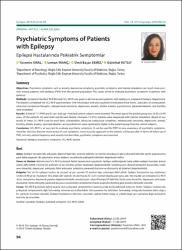Psychiatric Symptoms of Patients with Epilepsy
Abstract
Objectives: Psychiatric symptoms such as anxiety, depressive symptoms, psychotic symptoms, and mental retardation are much more common among patients with epilepsy (PWE) than the general population. This study aimed to evaluate psychiatric symptoms in patients with epilepsy. Methods: Symptom Checklist 90-R Revised (SCL-90-R) was given to all consecutive patients with epilepsy in outpatient Epilepsy Department. Participants completed the SCL-90-R questionnaire. One neurologist and one psychiatrist evaluated these forms. Subscales of somatization, obsessive-compulsive thoughts, interpersonal sensitivity, depression, anxiety, phobic anxiety, psychoticism, paranoid ideation, and hostility were evaluated. Results: A total of 111 PWE and 92 sex- and age- matched control subjects were included.The mean age of the patient group was 34.05 +/- 10.90 years. Of the patients, 43 were male and 68 were female. Fourteen (12.61%) patients were diagnosed with mental retardation. Based on our results of mean SCL-90-R score for each item, somatization, obsessive-compulsive symptoms, interpersonal sensitivity, depression, anxiety, hostility, phobic anxiety, paranoid ideation, and psychoticism were significantly higher in the patient group than the control subjects. Conclusion: SCL-90-R is an easy test to evaluate psychiatric symptoms. It can be used for PWE to raise awareness of psychiatric symptoms. Once the clinicians become more aware of such symptoms, more accurate approach to the patients will be possible. In terms of follow-up of PWE, not only seizure frequency and severity but also other psychiatric symptoms are important.
Source
EpilepsiVolume
25Issue
2URI
https://doi.org/10.14744/epilepsi.2019.95530https://app.trdizin.gov.tr//makale/TXpFeE9ESXdNQT09
https://hdl.handle.net/20.500.12809/1195


















